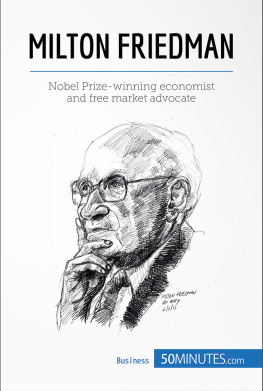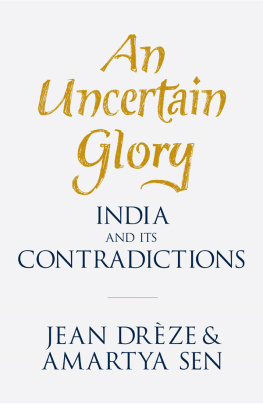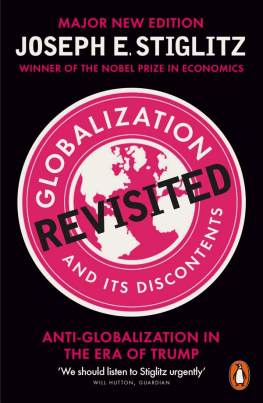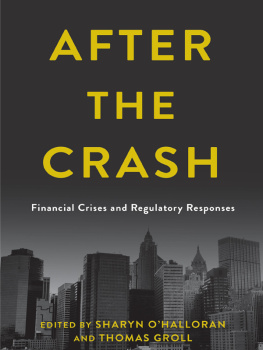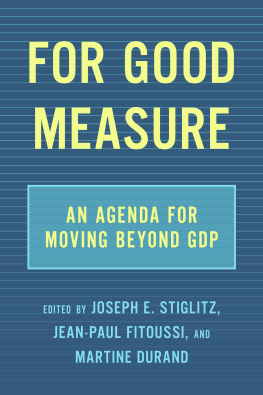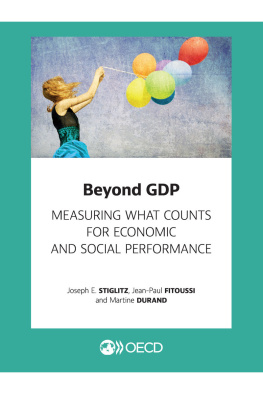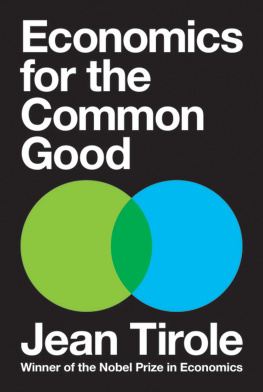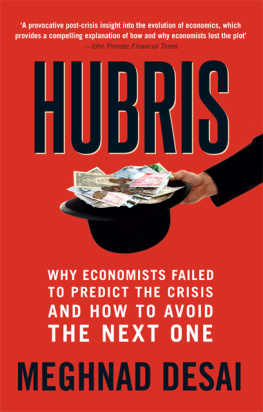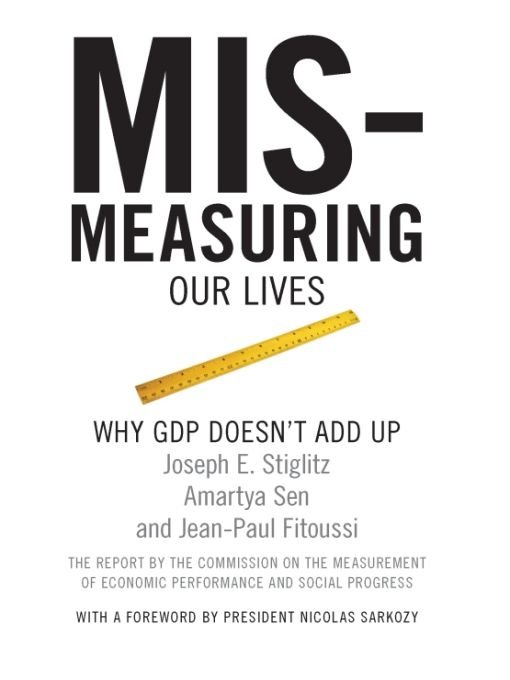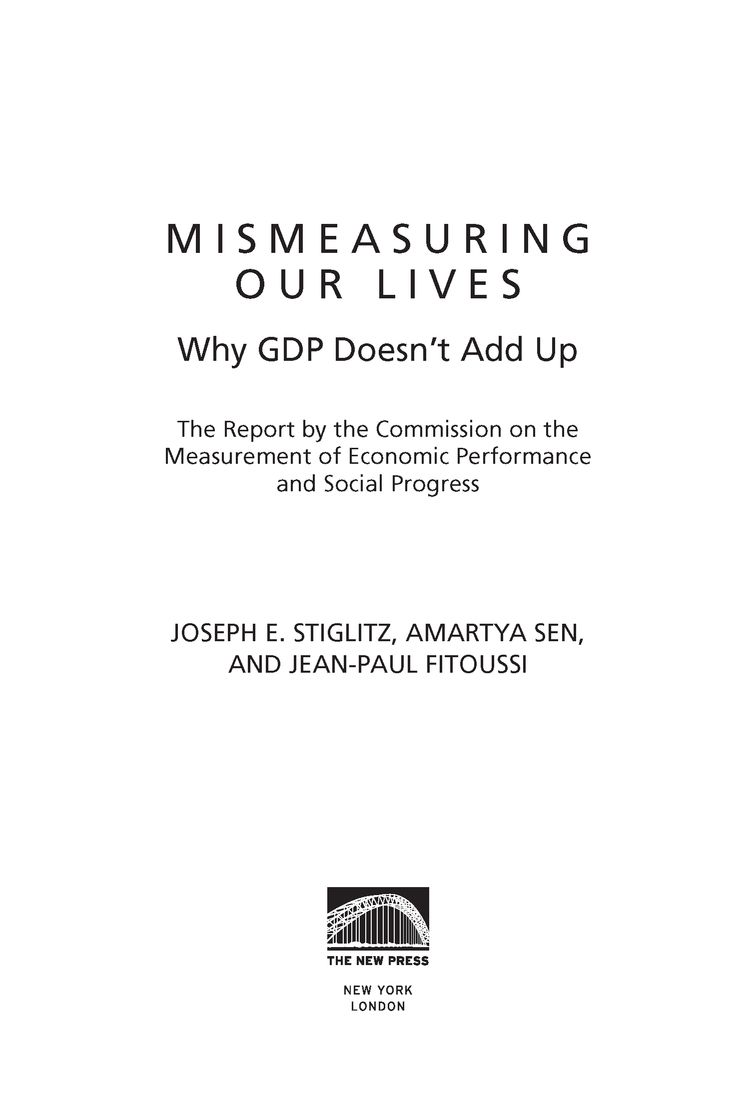Table of Contents
ALSO BY JOSEPH E. STIGLITZ
Freefall: America, Free Markets, and the Sinking
of the World Economy
Globalization and Its Discontents
Making Globalization Work
The Roaring Nineties: A New History of the Worlds
Most Prosperous Decade
The Stiglitz Report: Reforming the International Monetary and
Financial Systems in the Wake of the Global Crisis
The Three Trillion Dollar War: The True Cost of the Iraq Conflict
(with Linda J. Bilmes)
OTHER MEMBERS OF THE COMMISSION ON THE MEASUREMENT OF ECONOMIC PERFORMANCE AND SOCIAL PROGRESS AND RAPPORTEURS
Other Members
| Bina Agarwal | University of Delhi |
| Anthony B. Atkinson | Nuffield College |
| Franois Bourguignon | Paris School of Economics |
| Jean-Philippe Cotis | INSEE |
| Angus S. Deaton | Princeton University |
| Kemal Dervis | UNPD |
| Marc Fleurbaey | Universit Paris 5 |
| Nancy Folbre | University of Massachussetts |
| Jean Gadrey | Universit Lille |
| Enrico Giovannini | OECD |
| Roger Guesnerie | Collge de France |
| James J. Heckman | Chicago University |
| Geoffrey Heal | Columbia University |
| Claude Henry | Sciences-Po/Columbia University |
| Daniel Kahneman | Princeton University |
| Alan B. Krueger | Princeton University |
| Andrew J. Oswald | University of Warwick |
| Robert D. Putnam | Harvard University |
| Nick Stern | London School of Economics |
| Cass Sunstein | University of Chicago |
| Philippe Weil | Sciences-Po |
Rapporteurs
| Jean-Etienne Chapron | INSEE |
| General Rapporteur |
| Didier Blanchet | INSEE |
| Jacques Le Cacheux | OFCE |
| Marco Mira Dercole | OCDE |
| Pierre-Alain Pionnier | INSEE |
| Laurence Rioux | INSEE/CREST |
| Paul Schreyer | OCDE |
| Xavier Timbeau | OFCE |
| Vincent Marcus | INSEE |
FOREWORD
I hold a firm belief: We will not change our behavior unless we change the ways we measure our economic performance.
If we do not want our future and the future of our children and grandchildren to be riddled with financial, economic, social, and environmental disasters, which are ultimately human disasters, we must change the way we live, consume, and produce. We must change the criteria governing our social organizations and our public policies.
A tremendous revolution awaits uswe can all feel it.
This revolution will only be fully completed if it is first of all a revolution in our minds, in the way we think, in our mind-sets and values.
Such a revolution is inconceivable without deeply challenging the way we represent the consequences of what we undertake, the results of what we do.
If we apply the critical approach proposed by the commission headed by Joseph Stiglitz to the past two or three decades, and this leads us to revise our judgment regarding the consequences of our choices; if our models ultimately prove to have been counter-models; if our performance ultimately proves to have been poorthen the need for change becomes compellingly obvious.
But if we remain convinced that we have made genuine, sustainable progress during these years, why change?
Our statistics and accounts reflect our aspirations, the values that we assign things. They are inseparable from our vision of the world and the economy, of society, and our conception of human beings and our interrelations. Treating these as objective data, as if they are external to us, beyond question or dispute, is undoubtedly reassuring and comfortable, but its dangerous. It is dangerous because we get to the point where we stop asking ourselves about the purpose of what we are doing, what we are actually measuring, and what lessons we need to draw.
That is how the mind begins to close, leaving a doctrinaire approach with no room for doubt.
That is how we begin to march ahead blindly while convinced that we know where were going.
That is how we begin to create a gulf of incomprehension between the expert certain in his knowledge and the citizen whose experience of life is completely out of synch with the story told by the data. This gulf is dangerous because the citizens end up believing that they are being deceived. Nothing is more destructive of democracy.
All over the world, people believe that they are being lied to, that the figures are false, that they are being manipulated.... And there are good reasons for their feeling this way. For years, people whose lives were becoming more and more difficult were told that their living standards were rising. How could they not feel deceived?
For years, people were told that finance is a powerful engine of growth, only to discover one day that the risk it had accumulated was so great that it had plunged the world into chaos. Who could fail to understand why those who had lost their home, their job, their pension, would feel deceived?
For years the statistics portrayed increasingly strong economic growth as a victory over scarcity, until it came to light that this growth was endangering the future of the planet and was destroying more than it was creating. Is it any wonder that those whom we are now asking to make efforts and sacrifices and change their way of life before it is too late feel deceived?
The point is not that anyone wished to deceive people deliberately, for neither the statisticians defending the relevance of their GDP or price index nor the accountants convinced that their fair value is the best possible measure of an assets worth are liars.
The problem stems from the fact that our world, our society, and our economy have changed, and the measures have not kept pace. The problem stems from the fact that ultimately, without even realizing it, the statistics and the accounts were made to say things that they werent saying and that they couldnt say. We have wound up mistaking our representations of wealth for the wealth itself, and our representations of reality for the reality itself. But reality always ends up having the last word.
It is possible to go for a long time without paying the true price of scarcity and risk while being convinced of the contrary, but sooner or later the true price has to be paid. The bill is then much heavier, as behaviors based on these erroneous economic calculations have heightened the scarcity and the risk.
This is the situation in which we find ourselves today.
We have built a cult of the data, and we are now enclosed within. The enormous consequences of what we have done are beginning to dawn on us.
With all this in mind, in February 2008 I asked Joseph Stiglitz, Amartya Sen, and Jean-Paul Fitoussi to set up a commission composed of the worlds leading experts. To remedy the situation we face, we had to break with the old ways of thinking. A debate had to be launched at last. It had to be carried on at the highest levels of expertise. And it had to be global.


